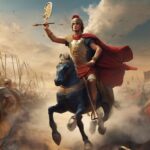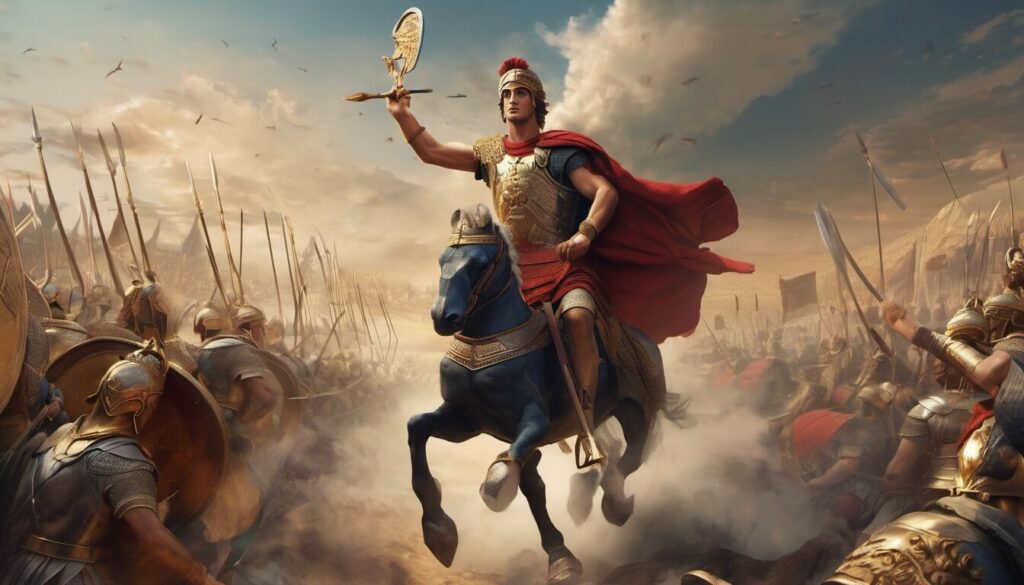Alexander the Great was born in 356 BCE in the city of Pella, Macedonia. He became one of the most famous leaders of ancient times. His life was full of military victories, intelligence, and a dream to unite the world.
Alexander had a great start in life. His parents were King Philip II of Macedon and Queen Olympias. He learned a lot from the famous philosopher Aristotle, who taught him about war, literature, philosophy, and science. This early education shaped how he saw the world and led people.
When his father, King Philip II, was killed in 336 BCE, Alexander became king at only 20 years old. He wanted to carry on his father’s plan to make Macedon strong and bring Greek cities together under his rule. He quickly took control and made sure people followed him.
But Alexander didn’t stop there. He wanted to conquer more lands and become famous. So, he led his soldiers in many battles, winning against tough enemies like Persia and Egypt. He was known for being brave and clever in war, and he took over new lands very quickly.
Alexander didn’t just want to rule; he wanted different cultures to mix peacefully. He built many cities where people from different places could come together to trade and learn. He hoped they would share their ideas and make the world a better place.
Even though he was a great leader, Alexander had some flaws. He could be quick to get angry and sometimes acted without thinking. But his soldiers and people still loved and followed him.
Sadly, Alexander died suddenly in 323 BCE, when he was only 32 years old. We don’t know exactly how he died, which has puzzled historians for centuries. But even after his death, people remember Alexander as a remarkable leader who changed the world forever.
In the end, Alexander the Great left behind a legacy that still inspires people today. He showed bravery, determination, and a big vision for the world. His story will be remembered for all time.
Early life and education of Alexander the Great
Alexander the Great had an interesting start to his life before becoming a famous conqueror. He was born in 356 BCE in Pella, the capital of Macedonia. His parents were King Philip II and Queen Olympias, who had big plans for their kingdom.
Even from a young age, people knew Alexander would do great things. He grew up in the royal court, surrounded by the rich culture of Macedonia. Stories of brave deeds and big victories filled his childhood.
But what really set Alexander apart was his education. When he was thirteen, he started learning from Aristotle, a famous philosopher. Aristotle was a smart teacher who taught Alexander about many subjects, like literature, philosophy, and art. He made Alexander really curious about the world and hungry for more knowledge.
But Alexander’s education wasn’t just about books. He also learned how to fight. His father, King Philip II, trained him in military skills like strategy and leadership. Alexander was a natural at it, showing talent from a young age.
The mix of smarts and strength in Alexander’s education made him special. By the time he became king at twenty, he was already a powerful leader, ready to follow in his father’s footsteps and bring Greek cities together under his rule.
Looking back at Alexander’s early life and schooling gives us clues about why he became such a famous conqueror. From growing up in the royal court to learning from Aristotle, Alexander was always hungry for knowledge and eager to make his mark on the world. It was this mix of brains and bravery that made him one of history’s greatest leaders.
Heir of Philip II
In 336 BCE, a sad event happened in Macedonia. King Philip II was killed, and his son Alexander, only 20 years old, became the new king. The kingdom was in trouble, with problems inside and threats from outside. But Alexander was determined to take charge and solve these issues.
As the ruler of Macedonia, Alexander didn’t waste any time. He worked hard to make sure he was in control and that people accepted him as the rightful king. He had to deal with tricky politics and family problems, but he managed them well. With the help of his father’s advisors, Alexander continued his dad’s plan to make Macedonia stronger and bigger.
With Alexander leading, Macedonia became very powerful. He led his army to many victories, from defeating enemies in battles like Chaeronea to taking over the huge Persian Empire. People saw him as one of the best military leaders ever.
But Alexander didn’t just want to conquer lands. He also wanted to bring different cultures together under his rule. He built cities like Alexandria, where people from different backgrounds could live and learn together.
Alexander’s journey from being Philip II’s son to becoming the ruler of a vast empire shows us what ambition, leadership, and determination can do. His actions changed history and left a legacy that still inspires people today. As Philip II’s successor, Alexander showed the world what true greatness is all about.
Creating One of the Largest Empires in History
The story of Alexander the Great is like an ancient adventure, full of big battles and bold moves. People still talk about him today because he was one of the greatest leaders in history. Let’s take a closer look at his amazing military journeys and how he built one of the biggest empires ever seen.
The Conquest of Persia
Alexander’s journey to greatness began with a mission to conquer the powerful Persian Empire, led by King Darius III. In 334 BCE, he took his army across the Hellespont into Asia Minor, starting a big fight that would change the world. Battles like Granicus, Issus, and Gaugamela showed Alexander’s bravery and clever tricks as his soldiers fought hard against tough odds.
When Persia fell, Alexander became a famous leader known for his smart military moves. But he wasn’t just after more land. Alexander thought of himself as a hero, freeing Asian people from Persian rule and bringing Greek culture to new places. Cities like Babylon and Susa were glad to see him because he brought a fresh start with him.
Subjugation of Egypt
After winning a big battle against Darius III at Gaugamela, Alexander went down to Egypt in 332 BCE. The Egyptians welcomed him warmly, happy to be free from Persian control. In a cool moment, Alexander visited an oracle in Siwa, where he was called the son of the god Amun-Ra. This made the Egyptians believe in him even more.
Under Alexander’s rule, Egypt became rich and smart. He built a city called Alexandria, which became a hotspot for learning and clever ideas. The Library of Alexandria and the Pharos Lighthouse showed Alexander’s love for knowledge and progress. He wanted everyone in his empire to be proud of Greek ways.
Annexation of Asia
With Egypt under control, Alexander looked to Asia for more land. His soldiers fought from Mesopotamia to Central Asia, winning city after city. The siege of Tyre was famous because it lasted for seven months, but Alexander never gave up. He showed bravery and smart thinking to win the fight.
But all this fighting had a downside. When Alexander’s troops sacked Persepolis, the Persian capital, it made some people angry. Even so, Alexander tried to make things better by encouraging Greeks and Asians to get along. He wanted everyone to feel like they were part of the same team.
The Legacy of Hellenistic Culture
One of Alexander’s biggest legacies was spreading Greek culture wherever he went. He took Greek language, art, and ideas with him, leaving a lasting impact on the places he conquered. Cities like Alexandria, Antioch, and Seleucia became hotspots for Greek culture, where smart people from all over the empire gathered to share their thoughts.
Alexander also loved supporting the arts and sciences. He wanted his empire to be a place where everyone could learn and grow, no matter where they came from. The Library of Alexandria became famous for its huge collection of books, attracting smart folks from all over.
In the end, Alexander’s story is about more than just fighting and winning. He showed that it’s possible to bring people together, no matter where they’re from. His empire might not have lasted forever, but his ideas about unity and learning still inspire us today. Alexander the Great will always be remembered as a leader who changed the world.
The Empire
Alexander the Great was a legendary ruler whose empire stretched across vast lands, from the shores of the Mediterranean to the banks of the Indus River. His rule was not just about conquering lands; it was about governing a diverse array of people, cultures, and languages. Let’s explore how Alexander tackled the immense challenge of ruling his empire and the innovative strategies he used to maintain unity and stability.
The Governance Challenge
Imagine being in charge of an empire so large that it spans multiple continents! That’s the situation Alexander found himself in after conquering vast territories. Unlike rulers before him who imposed strict control, Alexander knew he had to be flexible. His empire was diverse, with different landscapes and cultures, so he needed an approach that could adapt to these differences.
Cultural Syncretism
Alexander had a brilliant idea called cultural syncretism. Instead of forcing everyone to follow Greek ways, he blended Greek customs with local traditions. This created a sense of unity among his people. Alexander respected the beliefs of the locals while encouraging the adoption of Greek language and customs among the elites. This way, everyone felt included, reducing the chances of unrest.
Building New Cities
Alexander was a big fan of building cities. He built loads of them, and some even carried his name! These cities weren’t just for show; they became bustling hubs of trade, learning, and culture. People from all corners of the empire came together in these cities to exchange goods, ideas, and knowledge. It was like a big melting pot of different cultures and ideas.
Economic Prosperity
Alexander’s empire wasn’t just big; it was rich too! He set up trade routes that connected different parts of the empire. Cities like Alexandria and Babylon became major trading centers where merchants from far and wide gathered to do business. By sharing resources and expertise, the different regions of the empire prospered together. This economic interdependence helped maintain unity and stability.
Cultural and Intellectual Exchange
One of the most enduring legacies of Alexander’s empire was the exchange of ideas and knowledge. He encouraged the establishment of centers of learning and scholarship, like the famous Library of Alexandria. Scholars from Greece, Egypt, Persia, and beyond gathered here to study and share ideas. It was like a big brainstorming session that fueled intellectual and artistic achievements for centuries to come.
Alexander’s Lasting Legacy
Alexander’s empire was a testament to his vision, ambition, and ingenuity as a ruler. Through his policies of cultural syncretism, the establishment of new cities, and the promotion of economic prosperity and intellectual exchange, he created a vibrant and cosmopolitan empire that transcended ethnic, linguistic, and cultural boundaries. Although his empire didn’t last long after his death, its legacy endured, shaping the course of history and leaving an indelible mark on the ancient world.
In summary, Alexander the Great’s empire was more than just a collection of conquered lands. It was a melting pot of cultures and ideas, held together by innovative governance strategies. His ability to unite diverse peoples under his rule serves as a timeless example of leadership and diplomacy. Even today, we can learn valuable lessons from Alexander’s approach to governance and his vision of a unified and prosperous empire.
Character
Personality
At the heart of Alexander the Great’s character were qualities that made him stand out among his peers. He had a mix of ambition, intelligence, and charm that made him a remarkable leader. Since he was young, he dreamed of achieving greatness, aiming to surpass his father, King Philip II of Macedon. Alexander was a natural leader who could inspire those around him with his speeches and acts of bravery.
But Alexander wasn’t perfect. He had a quick temper and sometimes acted impulsively, which caused disagreements with his advisors and generals. His anger could lead to destructive outbursts and risky decisions that threatened his authority. Despite this, his charisma and charm won the loyalty and devotion of his soldiers and subjects, even when faced with challenges.
Relationships
Alexander’s first wife was Roxana, a princess from Bactria, whom he married during his campaign in Asia. Their marriage, initially for political reasons, turned into a genuine love story filled with mutual affection and respect. Roxana’s beauty and intelligence fascinated Alexander, and their union symbolized the merging of East and West.
After Roxana’s death, Alexander married several more times, including Stateira and Parysatis, daughters of the Persian king Darius III. These marriages aimed to strengthen Alexander’s power and bring Persian noble families into his empire. Stateira, especially, played a significant role as Alexander’s queen consort and bore him children.
Alexander had children with his wives, like Alexander IV with Roxana, who became the heir to the Macedonian throne, ensuring the continuation of Alexander’s dynasty. Besides Alexander IV, he had children with his Persian wives, like Heracles with Stateira. These children were also heirs to their father’s empire, playing vital roles in its succession and governance.
Relationship with Hephaestion
One of Alexander’s closest and most profound relationships was with Hephaestion, his childhood friend and confidant. Their bond, like brotherhood, grew stronger through shared experiences. Hephaestion matched Alexander in intelligence, bravery, and ambition, complementing each other in ways few others could.
Their friendship was built on respect, loyalty, and unwavering devotion. Hephaestion played a crucial role in Alexander’s military campaigns and political decisions, offering support and advice in difficult times. He was Alexander’s most trusted advisor and confidant, sharing both triumphs and tragedies.
The depth of their relationship has sparked debate among historians, with some suggesting a romantic aspect. Regardless, Hephaestion had a profound impact on Alexander’s life and reign.
Leadership Style
Alexander’s leadership style continues to fascinate and inspire admiration. His ambition, strategic brilliance, and determination led to vast conquests and left a lasting mark on history.
His ambition surpassed his time, dreaming not only of conquering new lands but also spreading Greek culture and ideals worldwide. In battles, Alexander showed strategic brilliance and daring tactics, outsmarting his enemies time and again.
As a leader, Alexander led from the front, sharing the dangers with his soldiers. His bravery inspired unwavering loyalty, as did his charisma and speeches, rallying his troops in the toughest times.
Alexander’s ability to adapt to change and seize opportunities was a key strength. He embraced innovation and creativity, adjusting strategies as needed, whether facing challenging terrain or enemy tactics.
Death
On either 10 or 11 June 323 BC, Alexander the Great passed away at the age of 32 in Nebuchadnezzar II’s lavish palace in Babylon. The details of his death are unclear, with two different stories told. According to Plutarch, Alexander’s health started to worsen about 14 days before he died, after a night of partying with Admiral Nearchus and Medius of Larissa. He got a fever that made him too weak to talk, worrying his soldiers, who quietly walked past him as he waved silently. On the other hand, Diodorus said Alexander felt terrible pain after drinking a lot of wine in honor of Heracles. He was weak for 11 days before he died, although he didn’t have a fever like in Plutarch’s version.
People have wondered if foul play was involved, with some thinking Alexander was poisoned. Writers like Diodorus, Plutarch, Arrian, and Justin talked about this, often pointing fingers at Antipater, who had been replaced as Macedonian viceroy by Craterus, and sometimes even Aristotle. However, Alexander was sick for a long time, about twelve days, which makes it hard to believe he was poisoned. But modern ideas, like the one from Leo Schep at the New Zealand National Poisons Centre, say that things like white hellebore could have been used to poison Alexander because it fits with the timeline of events.
Some say Alexander died from natural causes, like malaria, typhoid fever, and pyogenic spondylitis. An article in the New England Journal of Medicine in 1998 said he died from typhoid fever that made holes in his bowels and paralyzed him. But later, people suggested other reasons, like acute pancreatitis, West Nile virus, and Guillain-Barré syndrome. The toll of drinking a lot, getting hurt badly in battles, and feeling really sad after his friend Hephaestion died probably made Alexander’s health get worse until he died.
Legacy
Alexander the Great was a man of incredible ambition and skill in war. He left behind a legacy that still affects the world today. In this article, we’ll look at the many parts of Alexander’s legacy and how they’ve shaped politics, culture, and civilization.
Conquest and Empire Building
Alexander’s biggest legacy is the massive empire he built through bold military campaigns. He conquered lands from Greece to Egypt, from Persia to India, which changed the map of the ancient world. His armies traveled far and took over more land than anyone before him. This left a lasting legacy of conquest and control that lasted for hundreds of years.
Even though Alexander’s empire didn’t last long, it set the stage for Greek culture to spread across the world. He built cities called “Alexandrias,” which became centers of trade, learning, and culture. His dream of a world united under Greek rule left a big mark on history.
Cultural Diffusion and Hellenization
One big part of Alexander’s legacy is the spread of Greek culture, called Hellenization. As he marched east, his armies brought Greek language, customs, and ideas with them. This influenced the places they went, leaving a lasting mark on their societies.
In Egypt, Alexander was seen as a hero and was even called a god-king. He built the city of Alexandria, a hub of learning and culture with a famous library and museum.
In Persia, Alexander mixed Greek and Persian customs, marrying a Persian princess and letting Persian officials help him rule. He encouraged people from different cultures to marry and share their ideas, making his empire a mix of cultures.
Intellectual and Scientific Contributions
Besides conquering, Alexander also supported learning and science. He helped scholars and philosophers, which led to important ideas that shaped Western thought.
In Alexandria, the Library and Museum were places where people studied and learned from all over the world. Important Greek philosophers like Aristotle and Plato had their works kept there, which influenced Western science and philosophy.
Alexander’s conquests also helped share scientific knowledge between East and West, leading to big discoveries in fields like math, astronomy, and medicine. Great scientists like Euclid, Archimedes, and Hippocrates lived during this time and made discoveries that still matter today.
Legacy of Leadership and Inspiration
Overall, Alexander’s legacy shows what can happen with strong leadership, big dreams, and hard work. His military success, cultural influence, and support for learning still inspire people today.
His life and rule teach us about courage, strength, and new ideas. His legacy shows how much a leader can accomplish with determination and vision. It inspires people to aim high and make their own mark on the world.
In the end, Alexander’s legacy is like a big, colorful picture made up of conquest, culture, and learning. His empire set the stage for Greek culture to spread far and wide. His support for learning and science led to big discoveries and ideas that still matter today. And his leadership and dreams show us what’s possible when people aim high and work hard.










More Stories
The Mauryan Era: India’s first great empire
Battle of Verdun: The Longest Battle of World War I
The Great Depression: Overview, Causes and Effects